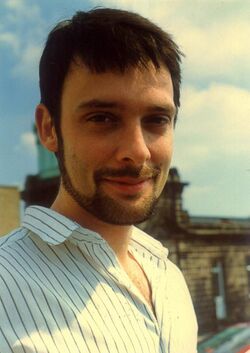Biography:John A. Peacock
John Peacock | |
|---|---|
 Peacock in 1989 while a staff astronomer at the Royal Observatory Edinburgh. The West Tower of the ROE is in the background. | |
| Born | John Andrew Peacock 27 March 1956 Shaftesbury, England |
| Alma mater | Jesus College, Cambridge |
| Known for | Large-scale structure of galaxies |
| Spouse(s) | Heather Peacock |
| Awards | Fellow of the Royal Society of Edinburgh (2006) Fellow of the Royal Society (2007) Shaw Prize in Astronomy (2014) |
| Scientific career | |
| Fields | Astrophysics, Cosmology |
| Institutions | University of Edinburgh |
| Thesis | The radio spectra and cosmological evolution of extragalactic radio sources (1981) |
| Doctoral advisor | Malcolm Longair, J. Wall |
| Website | www |
John Andrew Peacock, FRS, FRSE (born 27 March 1956)[1] is a British cosmologist, astronomer, and academic. He has been Professor of Cosmology at the University of Edinburgh since 1998.[2] He was joint-winner of the 2014 Shaw Prize.[3]
Early life and education
Peacock was born on 27 March 1956 in Shaftesbury, Dorset, England, to Arthur Peacock and Isobel Peacock (née Moir).[1][4] He studied Natural Sciences at Jesus College, Cambridge, and graduated with a first class Bachelor of Arts (BA) degree in 1977.[1] He then undertook postgraduate research at the University of Cambridge's Cavendish Laboratory under the supervision of M. S. Longair and J. V. Wall.[1] He completed his Doctor of Philosophy (PhD) degree in 1981 with a doctoral thesis titled "The radio spectra and cosmological evolution of extragalactic radio sources".[5]
Personal life
In 1982, Peacock married Heather. She is a nurse and medical educator. Together, they have three children.[6]
Honours
In 2006, Peacock was elected Fellow of the Royal Society of Edinburgh (FRSE).[7] In 2007, he was elected Fellow of the Royal Society (FRS).[8] In 2014, he was jointly awarded the Shaw Prize for Astronomy 'for their contributions to the measurements of features in the large-scale structure of galaxies used to constrain the cosmological model including baryon acoustic oscillations and redshift-space distortions'. His co-recipients were Daniel Eisenstein and Shaun Cole.[3]
References
- ↑ 1.0 1.1 1.2 1.3 "Curriculum Vitae: John Andrew Peacock". University of Edinburgh. http://www.roe.ac.uk/~jap/cv.pdf.
- ↑ "Biographical Notes of Laureates". The Shaw Prize Foundation. http://www.shawprize.org/en/shaw.php?tmp=3&twoid=96&threeid=232&fourid=403.
- ↑ 3.0 3.1 "The Shaw Prize in Astronomy 2014". The Shaw Prize Foundation. 27 May 2014. http://www.shawprize.org/en/shaw.php?tmp=3&twoid=96&threeid=232&fourid=402.
- ↑ "PEACOCK, Prof. John Andrew". Oxford University Press. November 2015. http://www.ukwhoswho.com/view/article/oupww/whoswho/U245862.
- ↑ Peacock, J. A. (1981). "The radio spectra and cosmological evolution of extragalactic radio sources". The British Library. http://ethos.bl.uk/OrderDetails.do?uin=uk.bl.ethos.279548.
- ↑ "Autobiography - John A Peacock". The Shaw Prize. 24 September 2014. http://www.shawprize.org/en/shaw.php?tmp=3&twoid=96&threeid=232&fourid=421&fiveid=205.
- ↑ "Directory 2013/14" (pdf). Royal Society of Edinburgh. 2013. http://www.royalsoced.org.uk/cms/files/publications/directory/directory_nolist.pdf.
- ↑ "Fellows". The Royal Society. https://royalsociety.org/about-us/fellowship/fellows/.

